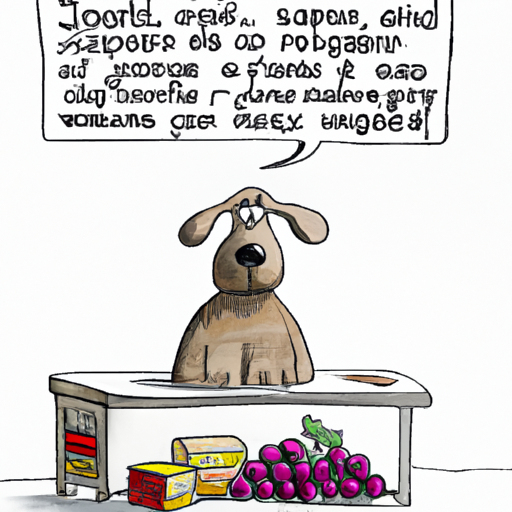As a caregiver for your beloved canine companion, it’s essential to know what foods are safe and, more importantly, which foods are potentially dangerous. So, let’s dive into the eight main categories of foods dogs should never consume.
1. Chocolate and Caffeine
Any form of chocolate can be dangerous to dogs. The culprit is theobromine, a compound that dogs can’t metabolize as efficiently as humans. The darker the chocolate, the higher the theobromine content, and the more toxic it can be.
Caffeine also contains this compound. The side effects can include:
- Restlessness
- Rapid breathing
- Heart palpitations
- Muscle tremors
2. Onions and Garlic
Onions and garlic, including their powdered forms, are part of the Allium family. They can damage a dog’s red blood cells, leading to anemia. Symptoms can include:
- Weakness
- Vomiting
- Breathlessness
3. Grapes and Raisins
The exact reason why grapes and raisins are toxic to dogs is unknown. However, their ingestion can result in kidney failure. Early signs include:
- Vomiting
- Lethargy
- Depression
4. Alcohol
Alcohol has the same effect on a dog’s liver and brain that it has on humans. But it takes far less to do its damage. Just a little can cause vomiting, diarrhea, central nervous system depression, problems with coordination, difficulty breathing, coma, and even death.
5. Xylitol
Xylitol is a sweetener used in many products, including gum, candy, baked goods, and toothpaste. It can cause insulin release, which can lead to liver failure. The increase in insulin leads to hypoglycemia (lowered sugar levels).
6. Dairy Products
While not immediately life-threatening, dairy products can cause digestive problems in dogs. This is because dogs lack the enzyme to break down lactose. Symptoms can include:
- Diarrhea
- Gas
- Vomiting
7. Macadamia Nuts
Macadamia nuts can cause weakness, depression, vomiting, tremors and hyperthermia in dogs. Signs usually appear within 12 hours of ingestion and can last approximately 12 to 48 hours.
8. Bones and Fat Trimmings
Both cooked and uncooked fat trimmings can cause pancreatitis in dogs. And even though it seems natural to give a dog a bone, they can choke on it. Bones can also splinter and block or cause cuts in your dog’s digestive system.
| Food | Symptoms |
|---|---|
| Chocolate, Caffeine | Restlessness, Rapid breathing, Heart palpitations |
| Onions, Garlic | Weakness, Vomiting, Breathlessness |
| Grapes, Raisins | Vomiting, Lethargy, Depression |
| Alcohol | Vomiting, Diarrhea, Coma, Death |
| Xylitol | Vomiting, Loss of Coordination, Liver failure |
| Dairy Products | Diarrhea, Gas, Vomiting |
| Macadamia Nuts | Weakness, Depression, Vomiting |
| Bones, Fat Trimmings | Choking, Cuts in the digestive system |
FAQ
Q: Is it okay for dogs to consume any amount of these foods?
A: No, it’s best to avoid these foods entirely. While small amounts may not cause immediate harm, repeated exposure can lead to serious health problems.
Q: What should I do if my dog consumes any of these foods?
A: If your dog consumes any of these foods, contact your vet immediately. They can guide you on the necessary steps to take.
Q: How can I prevent my dog from eating these foods?
A: It’s important to keep these foods out of your dog’s reach. Also, ensure that everyone in the household knows these foods are off-limits to the dog.
With this information, you’re now equipped to make the best dietary decisions for your furry friend. Remember, when in doubt, always consult a vet before introducing a new food into your dog’s diet.



